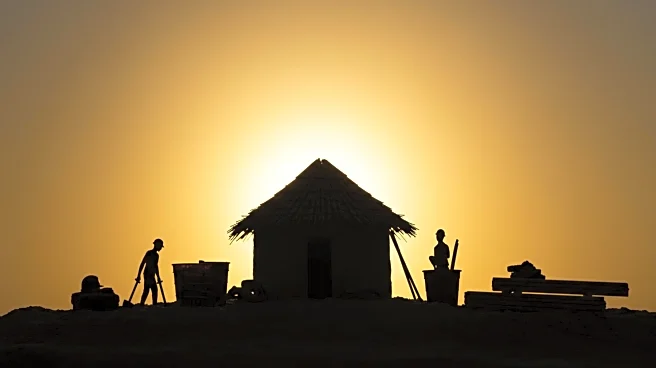What's Happening?
In Sudan, approximately 1.2 million people displaced by war have returned to Khartoum since December 2024, as the Sudanese Armed Forces regain control from the paramilitary Rapid Support Forces. The capital, previously the epicenter of conflict, is undergoing reconstruction efforts focusing on clearing war remnants, reopening roads, and sanitizing neighborhoods to prevent disease outbreaks. Despite the military's recapture of key areas, including the airport and ministerial buildings, residents face challenges such as destroyed infrastructure, lack of electricity, and scarce resources. The rebuilding process is estimated to cost billions, with efforts underway to restore basic services like electricity and water.
Why It's Important?
The return of displaced individuals to Khartoum signifies a critical phase in Sudan's recovery from prolonged conflict. The rebuilding efforts are essential for stabilizing the region and providing basic services to its residents. However, the extensive damage to infrastructure poses significant challenges, potentially hindering economic recovery and international aid efforts. The situation highlights the need for effective governance and international support to ensure sustainable reconstruction and prevent further humanitarian crises. The ongoing conflict and lack of civil order continue to threaten the safety and security of returnees, emphasizing the importance of establishing a stable and peaceful environment.
What's Next?
Sudanese officials are focusing on restoring essential services, including electricity and water, with plans to reinstate power in several districts soon. The reconstruction of Khartoum is expected to be a long-term endeavor, requiring substantial financial investment and international cooperation. As the military continues to secure the capital, efforts to rebuild infrastructure and provide humanitarian aid will be crucial. The potential for renewed conflict remains a concern, which could deter international donors and complicate rebuilding efforts. Community initiatives and charity kitchens play a vital role in supporting residents during this transitional period.
Beyond the Headlines
The rebuilding of Khartoum not only involves physical reconstruction but also addresses deeper societal issues such as organized crime and ethnic profiling, exacerbated by increased militarization. The lack of services and civil order creates a fertile ground for criminal activities, posing additional challenges to the region's recovery. The return of displaced individuals is a testament to their resilience and determination to rebuild their lives despite the hardships. The situation underscores the importance of addressing underlying social and political issues to ensure long-term stability and peace in Sudan.









